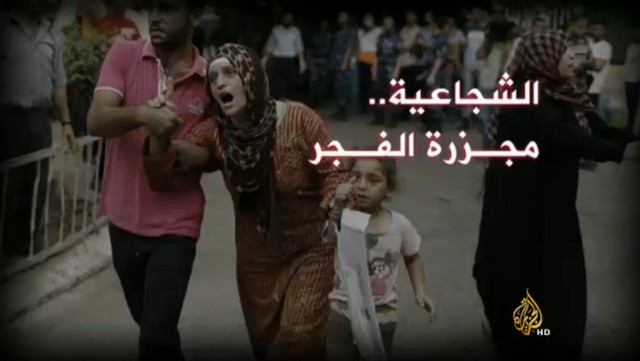By Shahd Abusalama
My body shakes as tears fall out of control after watching the first minute of Al Jazeera’s 22-minute documentary on the Shujaiya massacre which Israel committed in the eastern Gaza City neighborhood a week ago today, killing dozens and flattening the entire area.
Thinking that the footage contained in Massacre at Dawn is just a fraction of the horror makes it even worse. No wonder Israel prevented media from covering the brutality that our people endured there.
(Readers in the United States can watch the documentary with English subtitles here. It can also be watched on Al Jazeera Arabic without subtitles.)
I tried to put myself to sleep as only sleep can give me a break from the pain. My attempts failed. So I got up to share with you the most heartbreaking scenes that keep playing back once I close my eyelids.
“My son is gone!”
The mother’s voice at 3:35 in the video saying, “My son is gone! Mahmoud is gone” echoes in my mind.
The mother was running, escaping death along with her son. Her son suddenly is shot and falls. She stops despite that Israeli forces were still shooting.
She risks her life to rescue him and starts screaming, “My son got injured. My son is dying. Help!” But no ambulances are allowed there. Finally a man comes, carries her son and they continue running. I don’t know if they survived.
Watch the traumatized elderly man at 5:58 who stutters, out of breath, “There was shelling. Everything was bombed.”
“We were stuck in the house while bombings everywhere. My son was killed and my hand got injured,” he says (my translation). “My son is still over there [in the house]. We were sitting together. I went to the toilet. I returned to find blood flooding out of his neck. He has been bleeding since the morning.”
Listen to the cries of the man at 7:00 who tries to prevent the camera from filming him, refusing to appear broken. “Instead of [us] feeding our babies with milk, they sent them rockets!” he exclaims.
The reporter asks him, “Do you have a house here?” He replies, “I have a house and I lost my four kids,” trying to hide his tears from the camera.
“Are they kids? Don’t worry. Speak so the world can see what we’re suffering here,” the reporter says. So the man tries hard to continue with a voice choked with tears, ”They’re kids. I don’t know where they are!” They might be lost, or dead, or under the rubble, some people took them or they evaporated, he says.
Listen to the woman at 8:05 who is running and screaming like mad: “Our house collapsed over us while were inside. We left, miraculously” (my translation).
Orphaned child
Then comes the injured child Bisan Daher on her hospital bed at 9:35, whose condition is like countless others who were the only survivors of their massacred families. She lost her parents and her siblings.
At 10:20, a man is crying with his children: “We were sleeping at the house normally. I don’t know how, the house was shelled all of a sudden. And shelled once again. I got out to find my wife dying in the hallway” (my translation).
His son at 10:35 says (my translation): “Our house was destroyed and my mother was killed. We took her to hospital but she became a martyr. She was looking through the window of my sister’s room when a missile hit the apartment below us and killed her. And our house was destroyed, how will we live?”
At 10:55, the boy’s sister says, “We weren’t doing anything. I woke up after a ‘warning’ rocket hit our house. Only seconds later, we found Mom dying in the hallway. We started screaming, calling for ambulance to rescue her but she was already dead. May she rest in peace.”
“Just like in 1948!”
At 12:28, a man who is fleeing says (my translation), “At al-Mansoura street, we were running in between bodies, torn pieces are on both sides, everywhere. Houses collapsed over their inhabitants. Worse than Sabra and Shatila.”
Another man escaping with his family says at 16:10: ”Just like in 1948! We are fleeing again. Let the world hear this. This is a new exodus.”
Within the scene of people fleeing Shujaiya, an elderly man paralyzed by shock is unable to run. His son retrieves him and carries him on his back, as he says, “May God get revenge of them [Israel].”
#GazaUnderAttack: As you watch this, just remember that this is just a glimpse of the indescribable horror endured by our people in Shujaiya.
That’s why Israel didn’t want its ugliness to be reported to the world and prevented media from entering the area as they were massacring civilians.
Remember that these people are the voices who had a chance to be heard. They were luckier than others, who suffered and were killed amidst the world’s silence.
Shahd Abusalama, 23, is a Palestinian artist, a blogger and an English literature graduate living in Gaza City.
28 July, 2014
Electronicintifada.net

